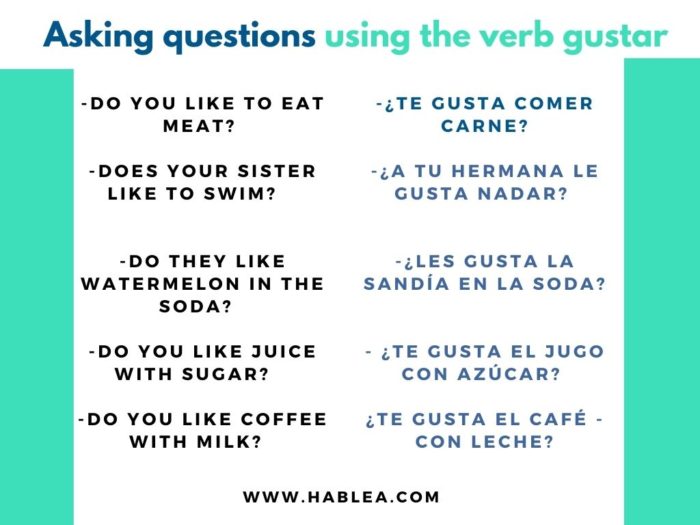Welcome to the comprehensive guide to gramatica c the verb gustar answers. In this guide, we will explore the definition, conjugation, agreement, usage in questions and negatives, and real-world examples of the verb gustar. Whether you are a beginner or an advanced learner of Spanish, this guide will provide you with the knowledge and understanding you need to master the verb gustar.
The verb gustar is a unique and important part of Spanish grammar. It is used to express liking or preference and can be used in a variety of contexts. In this guide, we will provide you with a clear and concise explanation of how to use the verb gustar correctly.
Definition and Explanation of Gustar
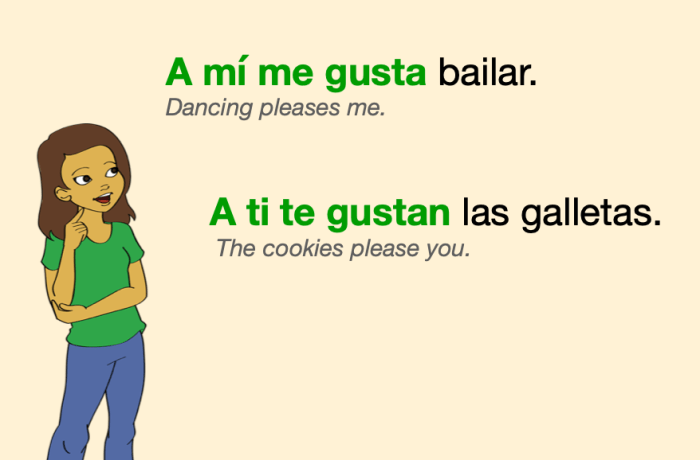
Gustar is a Spanish verb that means “to like” or “to be pleasing to.” It is a unique verb in that it does not follow the typical subject-verb agreement rules of Spanish. Instead, the subject of a sentence with gustar is always a person or thing that is experiencing the liking or preference, and the verb form is determined by the grammatical number and gender of the subject.
Gustar is commonly used to express personal preferences or to describe what someone finds enjoyable. It can be used in a variety of contexts, including:
- Expressing likes and dislikes: Me gusta el helado. (I like ice cream.)
- Describing preferences: Prefiero el café al té. (I prefer coffee to tea.)
- Asking for preferences: ¿Qué te gusta hacer? (What do you like to do?)
- Making general statements about preferences: A los niños les gustan los dulces. (Children like candy.)
Conjugation of Gustar: Gramatica C The Verb Gustar Answers
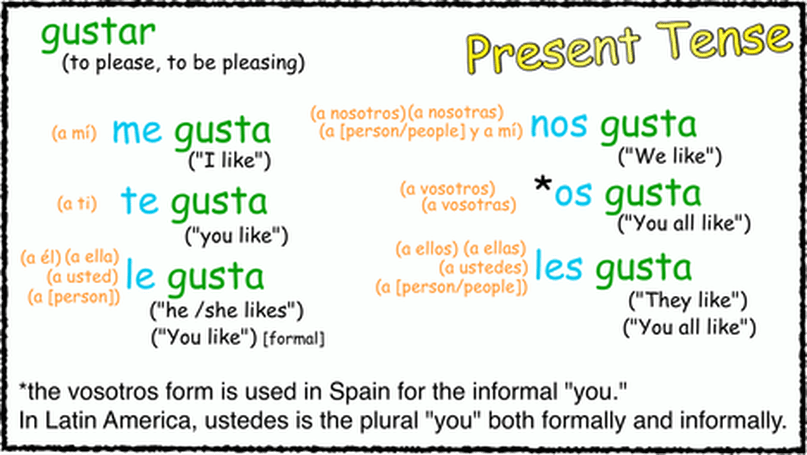
The verb gustaris an irregular verb in Spanish that means “to like” or “to be pleasing to.” It is conjugated differently from regular verbs, and its conjugation varies depending on the person and number of the subject.
The following table conjugates gustarin all present, past, and future tenses:
| Tense | Subject | Conjugation | Example |
|---|---|---|---|
| Present | yo | gusto | A mí me gusta el helado. (I like ice cream.) |
| tú | gustas | ¿Te gusta la música? (Do you like music?) | |
| él/ella/usted | gusta | A él le gusta leer. (He likes to read.) | |
| nosotros/nosotras | gustamos | A nosotros nos gusta viajar. (We like to travel.) | |
| vosotros/vosotras | gustáis | ¿Os gusta el cine? (Do you like movies?) | |
| ellos/ellas/ustedes | gustan | A ellos les gustan los deportes. (They like sports.) | |
| Past | yo | gustaba | Me gustaba el chocolate cuando era niño. (I used to like chocolate when I was a kid.) |
| tú | gustabas | ¿Te gustaban las películas de terror? (Did you used to like horror movies?) | |
| él/ella/usted | gustaba | A él le gustaba jugar al fútbol. (He used to like playing soccer.) | |
| nosotros/nosotras | gustábamos | A nosotros nos gustaba ir de camping. (We used to like going camping.) | |
| vosotros/vosotras | gustabais | ¿Os gustaba bailar? (Did you used to like dancing?) | |
| ellos/ellas/ustedes | gustaban | A ellos les gustaban los videojuegos. (They used to like video games.) | |
| Future | yo | gustará | Me gustará viajar por el mundo. (I will like to travel the world.) |
| tú | gustarás | ¿Te gustará la nueva película? (Will you like the new movie?) | |
| él/ella/usted | gustará | A él le gustará el regalo. (He will like the gift.) | |
| nosotros/nosotras | gustaremos | A nosotros nos gustará la comida. (We will like the food.) | |
| vosotros/vosotras | gustaréis | ¿Os gustará la fiesta? (Will you like the party?) | |
| ellos/ellas/ustedes | gustarán | A ellos les gustarán los dulces. (They will like the candies.) |
As you can see, the conjugation of gustaris irregular in the present tense. In the singular forms (yo, tú, él/ella/usted), the verb loses its final -r and adds the ending -o, -as, or -a. In the plural forms (nosotros/nosotras, vosotros/vosotras, ellos/ellas/ustedes), the verb takes the regular endings -amos, -áis, and -an.
In the past tense, the conjugation of gustaris regular. In all forms, the verb takes the ending -ba, -bas, -ba, -bamos, -bais, or -ban.
In the future tense, the conjugation of gustaris also regular. In all forms, the verb takes the ending -rá, -rás, -rá, -remos, -réis, or -rán.
Agreement with Gustar
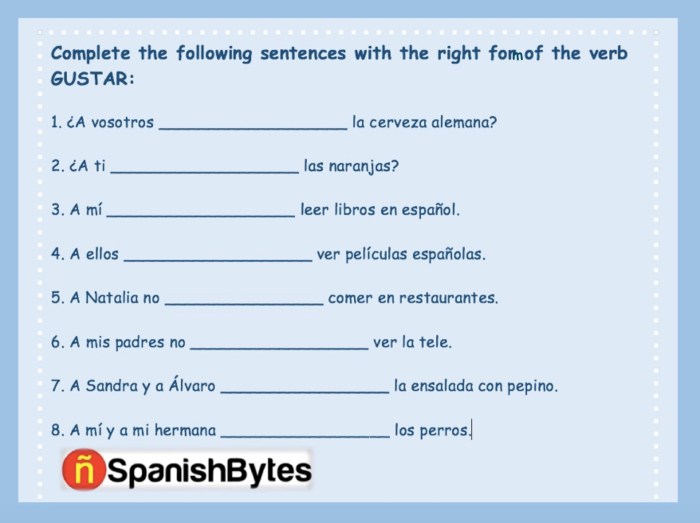
In Spanish, the verb gustar follows specific agreement rules with its subject and object, which can be either a person or a thing. Understanding these rules is crucial for using gustar correctly in sentences.
Agreement with the Subject
The subject of gustar is the person or thing that likes or dislikes something. When the subject is a singular noun or pronoun, the verb agrees in the third person singular (él, ella, usted). For plural subjects, the verb agrees in the third person plural (ellos, ellas, ustedes).
- A mí me gusta el helado. (I like ice cream.)
- A ti te gusta la música. (You like music.)
- A él le gusta leer. (He likes to read.)
- A nosotros nos gustan las películas. (We like movies.)
Agreement with the Object
The object of gustar is the thing or activity that is liked or disliked. When the object is singular, the verb agrees with it in the singular. For plural objects, the verb agrees in the plural.
- Me gusta el helado. (I like ice cream.)
- Me gustan los helados. (I like ice creams.)
- Te gusta la música. (You like music.)
- Te gustan las canciones. (You like songs.)
Exceptions
There are a few exceptions to the general agreement rules for gustar:
- When the object is a personal pronoun (me, te, le, nos, os, les), the verb always agrees with the pronoun, regardless of the number or gender of the subject.
- When the subject is indefinite (such as alguien, nadie, algo, nada), the verb is always in the third person singular.
Using Gustar in Questions and Negatives
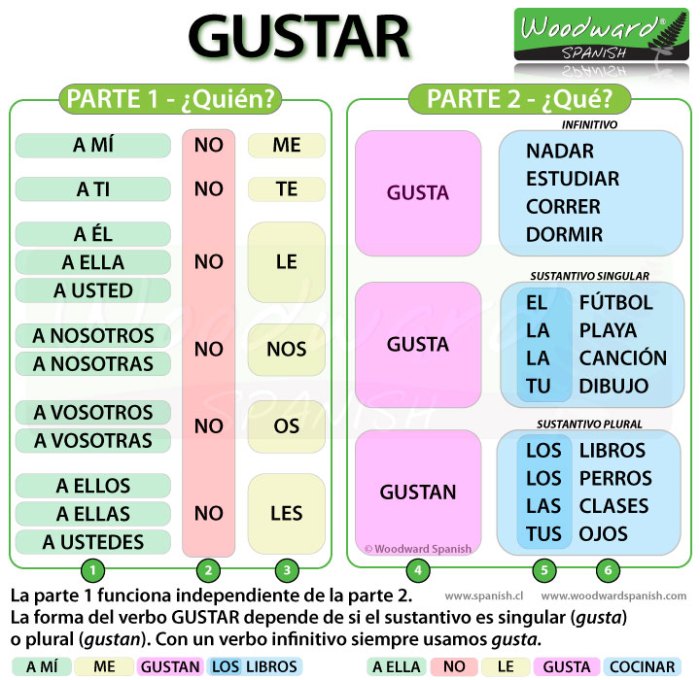
Gustar is a unique verb in Spanish that expresses preference or liking. To form questions using gustar, the subject pronoun is placed after the verb, followed by an inverted question mark. For example, “¿Te gusta el helado?” (Do you like ice cream?).
To form negative sentences using gustar, the word “no” is placed before the verb. For example, “No me gusta el café” (I don’t like coffee).
Using Gustar with Different Subjects
The conjugation of gustar changes depending on the subject. Here is a table showing the different conjugations:
| Subject | Conjugation |
|---|---|
| Yo | gusto |
| Tú | gustas |
| Él/Ella/Usted | gusta |
| Nosotros/Nosotras | gustamos |
| Vosotros/Vosotras | gustáis |
| Ellos/Ellas/Ustedes | gustan |
For example, “Me gusta leer” (I like to read), “Te gusta bailar” (You like to dance), and “Les gusta viajar” (They like to travel).
Gustar in Context

Gustar is a versatile verb that plays a significant role in everyday Spanish communication. It is commonly used to express opinions, preferences, and likes. Understanding the nuances of gustar is essential for effective communication in Spanish-speaking environments.
Expressing Opinions and Preferences
Gustar is used to express personal opinions and preferences. The subject of the sentence is the person or thing that is being liked or disliked, and the object of the sentence is the thing that is liked or disliked. For example:
- Me gusta el helado.(I like ice cream.)
- No me gusta el café.(I don’t like coffee.)
- ¿Te gusta la música clásica?(Do you like classical music?)
Expressing Likes and Dislikes
Gustar can also be used to express general likes and dislikes. In these cases, the subject of the sentence is the person or thing that is liking or disliking something, and the object of the sentence is the thing that is being liked or disliked.
For example:
- A mi madre le gustan las flores.(My mother likes flowers.)
- A mi hermano no le gustan los deportes.(My brother doesn’t like sports.)
- ¿A ti te gustan los animales?(Do you like animals?)
Cultural Significance, Gramatica c the verb gustar answers
Gustar is a culturally significant verb in Spanish-speaking countries. It is used to express a wide range of emotions and opinions, from simple likes and dislikes to more complex feelings. Understanding how to use gustar is essential for understanding the nuances of Spanish culture and for communicating effectively with Spanish speakers.
Answers to Common Questions
What is the verb gustar?
The verb gustar is a Spanish verb that means “to like” or “to be pleasing to.” It is used to express liking or preference for something.
How is the verb gustar conjugated?
The verb gustar is conjugated differently from other Spanish verbs. The following table shows the conjugation of gustar in the present tense:
| Person | Conjugation |
|---|---|
| yo | gusto |
| tú | gustas |
| él/ella/usted | gusta |
| nosotros/nosotras | gustamos |
| vosotros/vosotras | gustáis |
| ellos/ellas/ustedes | gustan |
How does the verb gustar agree with its subject and object?
The verb gustar agrees with its subject and object in gender and number. For example, the following sentence is correct:
A mí me gusta el helado.
In this sentence, the subject is “a mí” (which is feminine singular), and the object is “el helado” (which is masculine singular). The verb “gusta” agrees with both the subject and the object in gender and number.
How is the verb gustar used in questions and negatives?
The verb gustar is used in questions and negatives in the same way as other Spanish verbs. For example, the following sentence is a question:
¿Te gusta el helado?
In this sentence, the verb “gusta” is used in the question form. The following sentence is a negative sentence:
No me gusta el helado.
In this sentence, the verb “gusta” is used in the negative form.
What are some real-world examples of the verb gustar?
The verb gustar is used in a variety of real-world contexts. For example, you might use the verb gustar to express your liking for a particular food, movie, or song. You might also use the verb gustar to express your preference for a particular activity or place.
